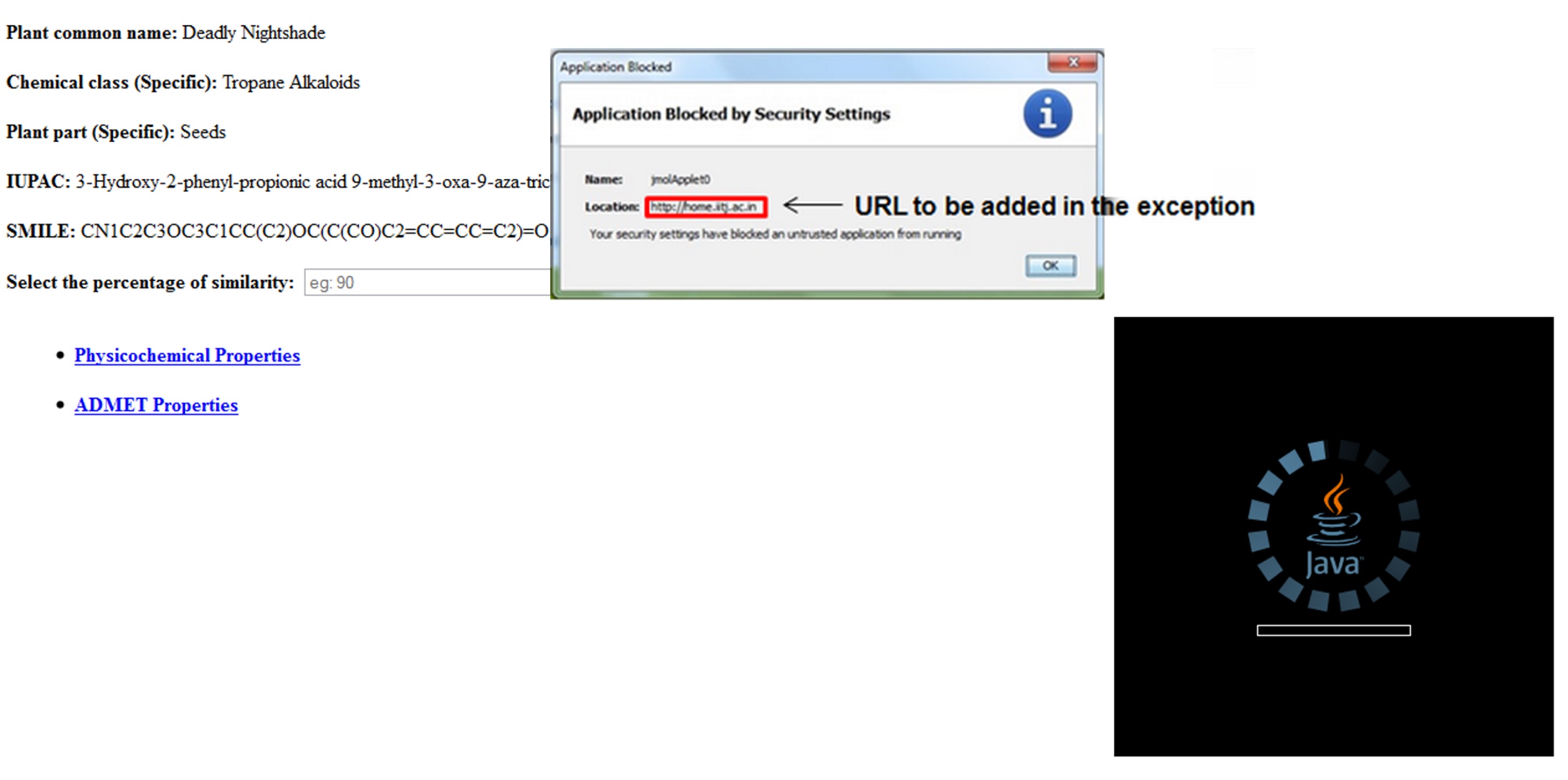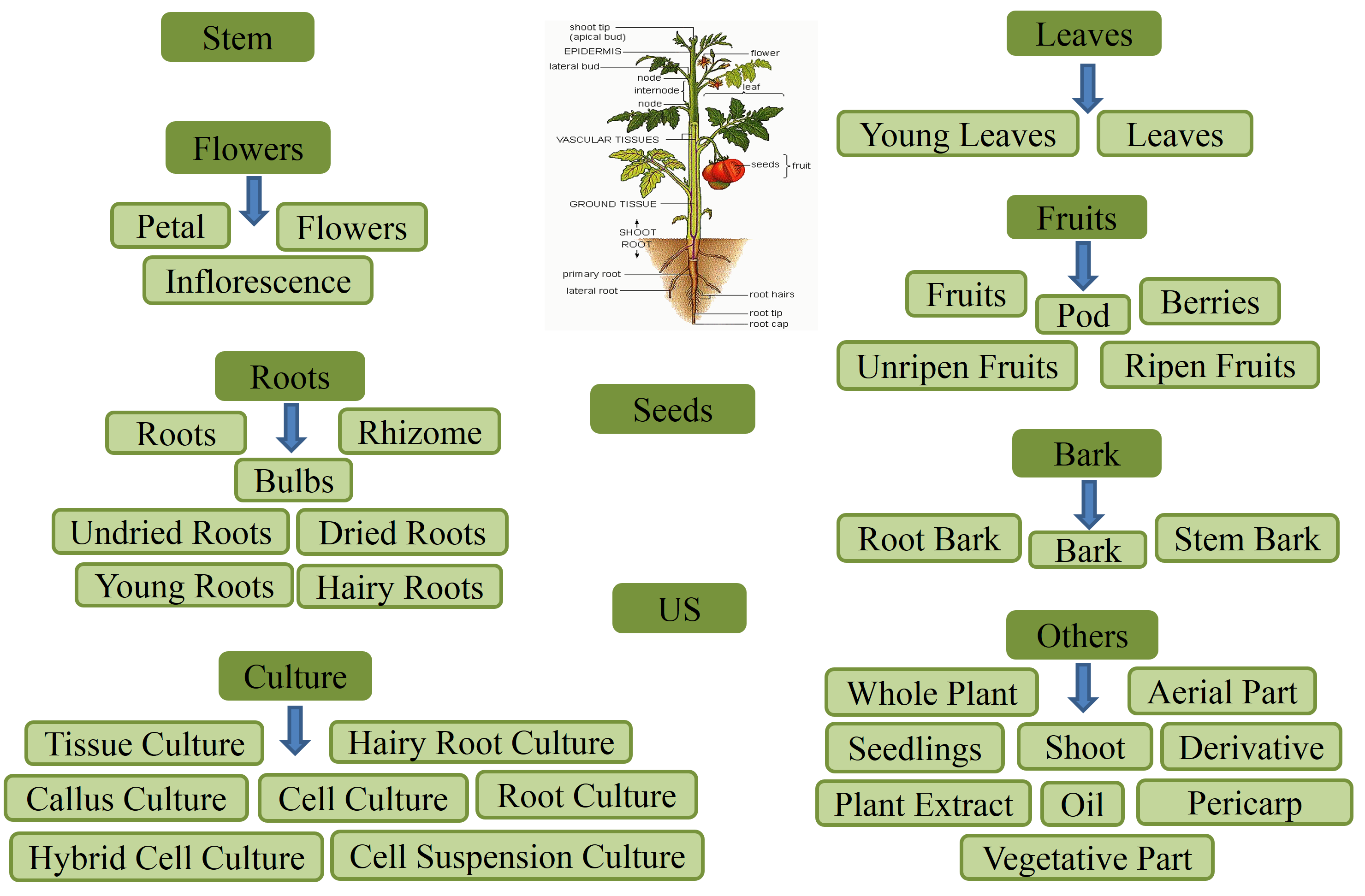FAQs about Phytochemica
What software do I need to take full advantage of Phytochemica?
Almost all features of the Phytochemica web site require a modern web browser with JavaScript and cookies enabled.
Here is a list of tested browsers grouped by desktop operating systems:
- Mozilla Firefox v4+
- Internet Explorer v7+
- Chrome v10+
- Safari v3+
What were the different languages used to develop Phytochemica?
- Design: HTML and CSS
- Dynamic Allocation: jQuery, JavaScript, and AJAX
- Database: MySQL
- Query connectivity: PHP
What softwares are required for perfect functioning of Jmol?
All browsers are installed with latest JAVA plugins. In case of any discrepancy, please install the latest JAVA plugin.
I get the following error message for Jmol visualisation → "The JAVA applet has been blocked because it is an untrusted application". What should I do?
This problem might arise in certain browsers due to the exceptions maintained by your respective browsers.

In such case please follow the following instructions:
Windows OS:
- Click on START
- Type "Configure JAVA"
- Click the "SECURITY" tab
- Click "Edit site list" at the bottom
- A window will open having an option "Add". Click on "Add"
- Another window will open. After the red exclamatory mark please type the entire URL displayed in the error. (In the image above the error is from http://home.iitj.ac.in)
This will clear the exception unblocking JAVA applets displayed from the particular website, but when you run the webpage for the first time you will get the following error:

Click 'Run'. After this the visualization should work perfectly.
What is source of Cascading Style Sheet (CSS) template used for Phytochemica?
Click here to be directed to the page containing the CSS template: Here
What are different Plant Parts reported in Phytochemica?
Number of PDM entries reflecting the abundance of PDMs from different plant parts:

The PDM entry was classified as 'Unspecified', when no specific plant part, from which it was extracted, was reported.
The plant part class 'Culture' includes following sub-categories:
What is Jmol?
Jmol is an open-source Java viewer for chemical structures in 3D, that does not require 3D acceleration plugins. Jmol returns a 3D representation of a molecule that may be used as a teaching tool, or for research e.g. in chemistry and biochemistry. It is free and open source software, written in Java and so it runs on Windows, Mac OS X, Linux and Unix systems.
Few technical advantages of Jmol are:
- Molecular 3D visualisation
- Zooming facilities
- Provision to download the viewed molecule in mol2 format
For further information please visit the Jmol website: Here
How to I download mol2 files from Phytochemica?
An interactive Jmol console is installed to enable 3D visualisation of the molecule. Right click on the Jmol window → File → Save copy of mol2.
What is the ZINC Similarity search?
ZINC is a free public resource for discovery of drug-like molecules.
The database contains over twenty million commercially available molecules in biologically relevant representations that may be downloaded in popular ready-to-dock formats and subsets.
The similarity search done against ZINC compares the input SMILE and each SMILE present in the database.
Depending upon the similarity percentage (Eg: 90% which is the default threshold) it displays the similar compounds.
For further information please visit the ZINC database: Here
What is the 'ADMET properties', displayed as user output?
All ADMET properties were extracted using the Discovery Studio (DS) application.
The following properties were obtained using DS:
- Human intestinal absorption
- Aqueous solubility
- ADMET_Solubility
- ADMET_Solubility_Level
- Blood brain barrier penetration
- ADMET_BBB
- ADMET_BBB_Level
- Plasma protein binding
- ADMET_EXT_PPB
- ADMET_EXT_PPB#Prediction
- ADMET_EXT_PPB_Applicability
- ADMET_EXT_PPB_Applicability#MD
- ADMET_EXT_PPB_Applicability#MDpvalue
- CYP2D6 binding
- ADMET_AlogP98
- ADMET_PSA_2D
- ADMET_Unknown_AlogP98
- Hepatotoxicity
- ADMET_EXT_Hepatotoxic
- ADMET_EXT_Hepatotoxic#Prediction
- ADMET_EXT_Hepatotoxic_Applicability
- ADMET_EXT_Hepatotoxic_Applicability#MD
- ADMET_EXT_Hepatotoxic_Applicability#MDpvalue
For further information please visit the Accelrys Discovery Studio 4.0: Here